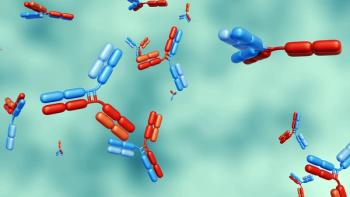
AbbVie Gains Nod from NICE for Tepkinly
NICE has recommended the use of AbbVie's Tepkinly as a treatment option for eligible adults with diffuse large B-cell lymphoma.
On Feb 1, 2024, AbbVie announced that the United Kingdom’s National Institute for Health and Care Excellence (NICE) has recommended Tepkinly (epcoritamab) as a treatment option for eligible adults with diffuse large B-cell lymphoma (DLBCL).
The recommendation, which was based on data from a single-arm Phase I/II clinical trial, is that the subcutaneous therapy be used in adults with DLBCL whose cancer has either returned or has not responded to two or more lines of systemic therapy. Epcoritamab is a bispecific antibody that has been designed to attach simultaneously to two different cells—an immune T cell and a cancerous lymphoma cell. Once brought together by the bispecific antibody, the immune T cell is activated to destroy the cancerous cell.
“DLBCL is a type of blood cancer, and while most people go into remission after standard treatment, some people can see their cancer return. Like many that experience blood cancer, people with relapsed or refractory DLBCL experience anxiety around the prospect of not responding to treatment or the cancer once again returning,” said Rincy George, policy officer at Blood Cancer UK, in the press release. “Epcoritamab (Tepkinly) is an injectable bispecific antibody designed to recognise and attach to the cancer cells and immune cells, so that the body’s immune system can destroy them. [This] decision from NICE approving epcoritamab for eligible patients for use on the NHS [National Health Service] in England and Wales is a welcome step for many.”
“Despite recent therapeutic advances, treatment options for this hard-to-treat group of patients have been limited. This can mean many patients do not have suitably effective treatment options, resulting in a poor prognosis,” added Chris Fox, professor of Haematology, School of Medicine, University of Nottingham and Honorary Consultant Haematologist, Nottingham University Hospitals NHS Trust, in the press release. “Today’s decision by NICE on epcoritamab provides physicians with a second bispecific antibody as a treatment option for eligible patients with relapsed or refractory diffuse large B cell lymphoma after two or more lines of therapy.”
“AbbVie is committed to advancing care for people living with blood cancer,” stated Belinda Byrne, medical director, AbbVie UK, in the press release. “We are delighted that NICE has recognized the benefit that epcoritamab can have on the lives of people living with R/R [relapsed/refractory] DLBCL. We will continue working closely with the relevant authorities to provide equitable access across the UK for eligible R/R DLBCL patients in need.”
Source:
Newsletter
Stay at the forefront of biopharmaceutical innovation—subscribe to BioPharm International for expert insights on drug development, manufacturing, compliance, and more.




